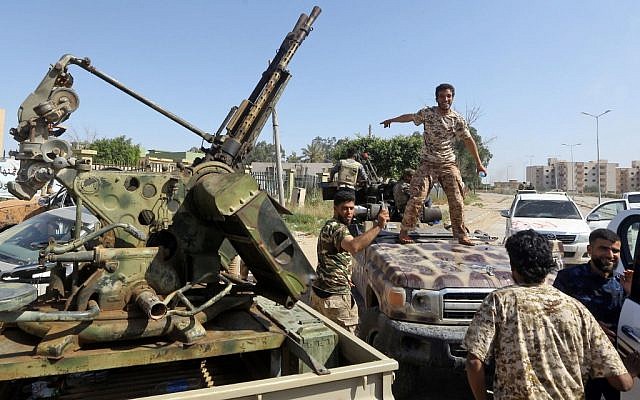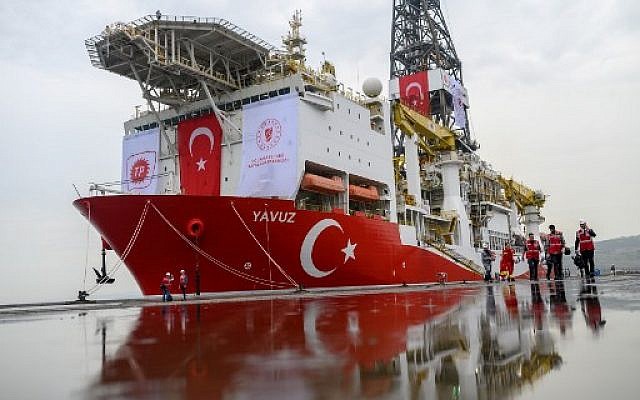In interview with Israeli paper, top Libyan rebel calls for Israel’s support
Abd al-Salam al-Badri, deputy PM in eastern-based government, rails against Turkish efforts to claim natural gas resources in Mediterranean and urges Israel to oppose them
The Times Of Israel, 12 June 2020
Forces loyal to Libya's Government of National Accord (GNA) gesture on April 18, 2019, after taking
control of the area of al-Aziziyah, located some 40 kilometers south of the Libyan capital Tripoli, following
fierce clashes with forces loyal to strongman Khalifa Haftar (Mahmud TURKIA / AFP)
In a rare interview with an Israeli newspaper, a senior Libyan official with the eastern-based rebel government has called on Israel for support in the latest sign of the diminishing of anti-Israel taboo in Arab politics.“We never were and never will be enemies, and we hope you will support us. It is only circumstance which has separated us up until this point,” Abdul Salam al-Badri told the Israeli newspaper, Makor Rishon, in excerpts from a full interview scheduled to be published this weekend.
The paper, associated with Israel’s national religious camp, said al-Badri, who is deputy prime minister in the government affiliated with strongman General Khalifa Haftar, gave the interview from Benghazi. It gave no further details.
Israel has no official ties with Libya, which was a staunch supporter of the Palestinian cause, especially under dictator Muammar Gaddafi, who was overthrown in 2011.
Libya has been in turmoil since 2011 when a civil war toppled long-time dictator Gaddafi, who was later killed. The country has since split between rival administrations in the east and the west, each backed by armed groups and foreign governments. The UN-recognized Fayez al-Sarraj’s Government of National Accord remains in Tripoli.
Libya’s Khalifa Haftar, third left, leaves after an International Conference on Libya at the Elysee Palace,
in Paris, France on May 29, 2018. (AP Photo/Francois Mori)
Haftar, who launched an offensive aimed at capturing Tripoli last year, is backed by the United Arab Emirates, Egypt and Russia, while the Tripoli-based militias are aided by Qatar, Italy and Turkey.Israel has avoided taking a public stance on the war, despite allegations of Israeli involvement behind the scenes. However, Israel is widely seen as being aligned with Egypt and the Gulf states.
Al-Badri pointed to recent stepped up intervention by Turkey, in his appeal to Israel.
“[Turkish President Recep Tayyip] Erdogan is not only insane. He is also a friend to the corrupt Emir of Qatar, and hired out thousands of Syrian mercenaries, all in the name of taking over Libya’s oil fields,” he said.
With Turkey’s military support, the Tripoli-based forces have gained the upper hand after retaking the capital’s airport, all main entrance and exit points to the city and a string of key towns near Tripoli in recent weeks.
“We share a common interest. Erdogan is a terrorist, and both of us are on the same side. It would be idiotic of us to ignore that,” al-Badri said.
Israel’s once good ties with Ankara have become strained over the last decade, but the two countries still maintain diplomatic relations despite ongoing tensions, particularly over natural gas in the region.
Journalists walk next to the drilling ship ‘Yavuz’ scheduled to search for oil and gas off Cyprus, at the
port of Dilovasi, outside Istanbul, on June 20, 2019. (Bulent Kilic/AFP)
In Libya, Turkey seeks not only to push back its regional enemies, but also to ensure the success of a lucrative oil and gas agreement with al-Sarraj’s government in Tripoli. The Turkey-Libya maritime oil accord in the Eastern Mediterranean, grants Turkey rights to drill for oil and gas in a vast area of the Mediterranean, despite the objections from Greece, Cyprus and Egypt. Turkey has said it will begin exploring for natural resources there within months.Al-Badri called on Israel to join these nations in signing a common maritime agreement.
Israel has emerged as a natural gas player in recent years, forming the East Mediterranean Gas Forum with Egypt, Greece and Cyprus. The bloc views the accord between Ankara and Tripoli as a threat to their maritime rights.
Al-Badri played up Libya’s historic Jewish community, which he described as leaving a legacy of tolerance, and has said his government supported a two-state solution to the Israeli-Palestinian conflict.
“Throughout history, we have served as a refuge for people of all faiths. We have a long history of contact with the people of Israel and the Jewish community,” he said.
While the Libyan Jewish community dates back thousands of years, most Jews fled the country in 1949 amid rising anti-Semitism following Israel’s establishment. Successive pogroms against Jews in the country and laws restricting Jewish civil liberties encouraged still more to emigrate. By the time Gaddafi rose to power in the 1960s, few were left.
Agencies contributed to this report.
Pro-Haftar rebel official calls on Israel for support
"We never were and never will be enemies" says Abdul Salam al-Badri in interview to Makor Rishon
By Anna Ahronheim
The Jerusalem Post, June 13, 2020
A top official close to Libyan General Khalifa Haftar has called on Israel for support in the war against the internationally-recognized Government of National Accord (GNA), saying the two countries have shared interests.
“We never were and never will be enemies, and we hope you will support us,” Abdul Salam al-Badri, deputy prime minister of the eastern-based government, told the Israeli newspaper Makor Rishon. “It has been only circumstance which has separated us up until this point.”
While Israel and Libya have no relations and Jerusalem has avoided any public discussion on the war, it is widely speculated to be supporting Haftar’s forces along with Egypt and the Gulf states.
Over the years there have been multiple reports of Israelis training Haftar’s forces in street warfare in territory under his control, and Israeli weapons systems have also reportedly been sent to the war-torn country.
Appealing to Israel, al-Badri said “We share a common interest: Erdogan is a terrorist. Both of us are on the same side, it would be idiotic of us to ignore that.”
Abd al-Hadi al-Hajj, foreign minister to Haftar’s interim government, told The Jerusalem’s Post’s sister publication Maariv in December that he hopes Libya could establish normal relations with Israel if the Palestinian problem was resolved.
“We support the rights of the people, including all of the rights of the Palestinian people. But we support regional peace, oppose terrorism, and fight it in Libya as well,” he told the publication while in Paris.
Though there are not many Jews left in the North African country, al-Badri played up Libya’s historic Jewish community, saying that “throughout history, we have served as a refuge for people of all faiths. We have a long history of contact with the people of Israel and the Jewish community.”
While expressing support for the two-state solution, he told the paper that “we look for a new map that takes into consideration the interests of our countries alongside the other countries in the region.”
Al-Badri also called on Israel, which has in recent years emerged as a player in the natural gas field, to join the Mediterranean Gas Forum – a maritime cooperation agreement among Greece, Cyprus, Egypt, and Lebanon – which views the accord reached between Libya and Turkey as a threat since it allows Ankara rights to drill for oil and gas across the Mediterranean.
“The initiative is about signing a joint marine agreement in line with the sea border demarcation agreement signed by Turkey and the Libyan government in Tripoli,” he said.
Though the United Nations Security Council has repeatedly renewed the arms embargo on Libya since 2011, both sides have received significant military aid by numerous countries.
Haftar, who sits in Tobruk in eastern Libya has been heavily backed by Egypt, Saudi Arabia, UAE, France and Russia since 2014.
Russia and the UAE have been heavily supporting Haftar’s forces with various weapons systems, including a Pantsir air defense systems, MiG-21 fighter aircraft and Mi-24/35P helicopter gunships, as well as armored vehicles. Russia has also sent some 2,000 mercenaries from the private military contractor Wagnar to the country since 2018.
The Tripoli-based GNA led by Fayez al-Sarraj is supported by Italy, Qatar and Turkey – which has sent troops as well as Turkish-backed Syrian rebels to fight in the war-torn country. With Turkish support, the GNA gained the upper hand recently and forced Haftar’s fighter to withdraw from key cities in the country.
GNA troops have inflicted heavy losses to Haftar’s forces and pushed them to withdraw from around Tripoli and Bani Walid towards the border with Tunisia. Bolstered by battlefield gains, Sarraj’s military has launched another operation to retake Sirte and al-Jufra.
|
Races? Only one Human race United We Stand, Divided We Fall |
 |
No time to waste. Act now! Tomorrow it will be too late |
|





































